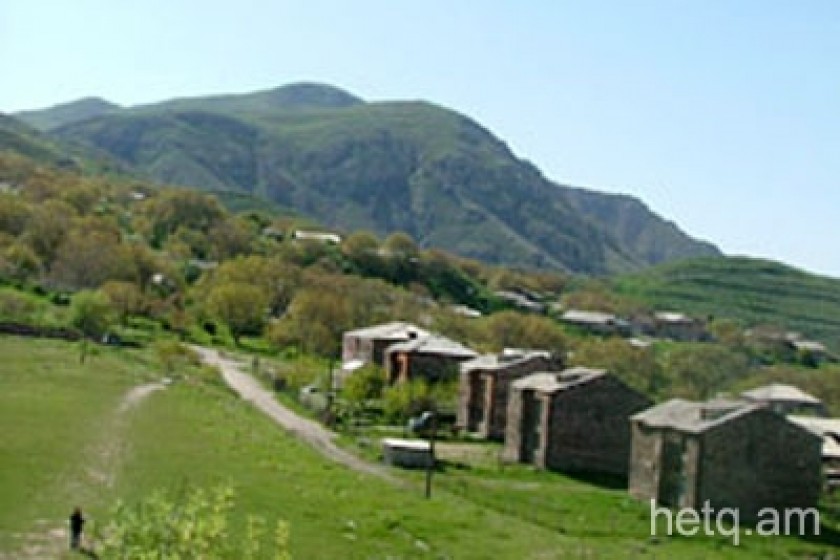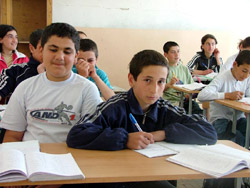
We Feel Abandoned
“There is nothing to do in the village. After school, we go to the village square, sit down and talk about this and that. We don't even have an ordinary café to take girls to. There's only a restaurant, but instead of two cups of coffee you can only order two bowls of borsch, “ says 10 th grader Norayr. Our conversation took place just before the Last Bell ceremony. Students in thevillageofKhachikin the Vayots Dzor Marz were preparing for graduation and pondering their future. All of them wanted to go to college, no matter where, just as long as they received higher education, because “you need a diploma to achieve anything in this life.”
The young people here hope to go to aYerevanuniversity or to theYeghegnadzorPedagogicUniversity, which is now in its second year. The children of poor families can study on a scholarship from the regional government, but after they graduate they are obliged to return to the village and work for three years. “However,” said village schoolmaster Heriknaz Ohanyan, “The children usually do not use this opportunity, because there is nowhere to work in the village. They can't even work at the school because there is a surplus of teachers here.”
 The village school has 170 students. This year, there were thirty students in the two graduating classes, and only four children in first grade and three in preschool. Officially Khachik has 1,096 residents, but there are actually only 970 people living in the village; the rest are away. Most of those who are left are older; weddings are rare here, and the birth rate is low. The head of the village administration says that the young people are reluctant to marry and start families that they will be unable to support.
The village school has 170 students. This year, there were thirty students in the two graduating classes, and only four children in first grade and three in preschool. Officially Khachik has 1,096 residents, but there are actually only 970 people living in the village; the rest are away. Most of those who are left are older; weddings are rare here, and the birth rate is low. The head of the village administration says that the young people are reluctant to marry and start families that they will be unable to support.
“There are many young men here who are nearing thirty and not married. Whoever does get married almost always goes away to work. Usually, they leave alone and come home once a year. The rest of the time they send money home. Now, many are leaving. During the war no one left. Everyone defended the village.
“You can't blame them. There are no jobs in the village. There is only the village administration, the water system, and the army barracks. Before the war, we had an electrical appliance factory, and there were eighty women working there. We had a kindergarten, but after the war they place was turned over to the barracks. There is a woman at the school, some parents bring kindergarten-age children to her and she looks after them.”
In January, extracurricular classes in theatre, dance, sport, sewing, carpet-weaving, sewing, English and drawing opened at the school. The classes are sponsored by the Monte Melkonyan charity organization. According to the director of the school, these activities are of great benefit to the school students, since there is little do in the village. The school building hasn't been renovated in ten years. The tiles are falling down, there is not enough furniture, the roof leaks, and the wind blows through cracks in the windows. The classrooms are heated with electric heaters; natural gas is a distant dream.
Khachik is a border village reached by a narrow, winding road. In Raffi's novel Davit Bek the village is called Arastamukh. From the road that climbs to it, the village appears to be suspended between the earth and the sky. There are several theories regarding the village's current name, Khachik. In the village there is a crumbling church called Karakop, which was last repaired in the 10 th century. In the church there was a priest called Khachik, who raised a khachkar next to the church, on which it was written “I built my own cross.” According to one theory, the village was renamed for this priest.
According to another theory, Saint Tadevos left a portion of the cross here when he passed through the village. A third legend explains that the village boundaries were drawn with khachkars. The last, and according to the residents, the most probable theory is not connected with khachkars. Once, a count came to the village to hunt. The cord with which he had tethered his falcon became tangled in a tree branch. The count called the villagers and promised to reward whoever freed the bird, and to behead anyone who injured the bird. Only an archer named Khachik was brave enough to approach the bird and free it. The happy count named the village after him.
The village has about 300 hectares of fertile land, which even in 1918 were covered with an irrigation system. The village head says that the main problem in Khachik is the lack of drinking water.
“Besides that, we have a significant area of meadow lands, which are near the border, and we cannot use them. They are especially important during spring and fall.” The villagers raise crops and livestock. But this is not a very profitable occupation.
“First, there is a lack of water, and second, the village is far from the main road, so it's hard to sell meet, dairy products, and crops, “ the villagers explained. “Especially during the last few years, we have felt abandoned. It seems that the government has forgotten about us. But these the strategically important villages should be under government care.”
 Videos
Videos Photos
Photos




Write a comment